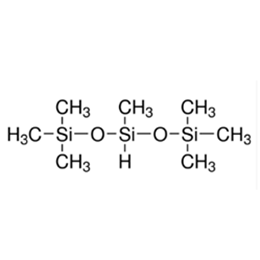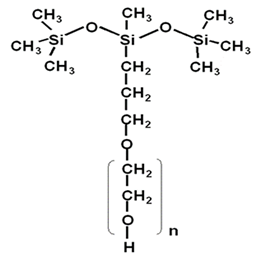1. The super expansion ability is more conducive to the liquid wetting of the target drug.
The expansion of the liquid medicine on the surface of the plant leaf or insect pests directly affects the efficacy of the drug, which is inseparable from the surface tension of the drug solution. After the solution is applied to the target, the wetting effect can only be achieved when the surface tension of the liquid medicine is lower than the critical surface tension of the target. The greater the surface tension is, the less likely the drug solution is to wet the target, the less the target absorbs and penetrates the drug solution, and the worse the medication effect is.
Take plants as an example: the critical surface tension of plants is generally above 30 caine, the surface tension of clean water is generally 72.4 caine, and the lowest surface tension of conventional pharmaceutical active agents is about 30 caine. If the silicone surfactant with extremely low surface tension is added to the solution, the surface tension of the water can be reduced to about 21-22 caine, which can make the chemical liquid wet the leaves of crops or weeds faster, and allow the leaves to absorb the medicine earlier and more. Liquid, which can naturally greatly improve the effectiveness of drug control.
![]()
In addition, because most plant leaf surfaces and pest body surfaces have epidermal cuticles, waxy layers, fluff, or rough surfaces that are not easy to adhere to the liquid medicine. Spraying the liquid medicine diluted with water directly on these surfaces is very unstable, which is not easy to adhere to and wet, but also easy to roll down naturally or slide down due to external force vibration, which will cause the loss of effective ingredients of the drug and fail to exert its due efficacy. These problems can be solved by adding silicone surfactant with super expanding wetting ability, so as to maximize the efficacy of the drug.
2. The contact angle is smaller, which can greatly improve the spreadability of the drug solution on the drug target
When the liquid medicine is sprayed on the leaves or the surface of the pests, the smaller the contact angle between the liquid medicine and them, the better the expansion and distribution of the liquid medicine, and the better the effect of the medicine. The contact angle is directly related to the surface tension of the liquid medicine. The greater the tension, the larger the contact angle, and the worse the effect of the medicine. If the contact angle is less than 90 degrees, the liquid medicine generally does not roll off, but when the contact angle of the liquid medicine is greater than 90 degrees and above, the chemical liquid sprayed on the leaves will roll off and lose. Silicone surfactant has a very low surface tension, which can greatly reduce the contact angle of the liquid sprayed on the plant leaves and the surface of the pests, so it can achieve better drug effects.
![]()
3. Strong scalability, which can greatly increase the coverage area of the liquid medicine on the target
The coverage area of the liquid medicine on the surface of the leaves and insects determines the effect of the medicine. Because of the strong expansibility of silicone surfactant (described above), it can make the coverage area of the liquid sprayed on the surface of crops, weeds, and pests larger, and make the liquid penetrate into the target object more effectively. Adding silicone surfactant liquid medicine can double the area covered by the liquid medicine on crop leaves, which is also an important reason why the use of silicone additives can greatly improve the effect of pest control.
![]()
4. Strong osmotic absorption and resistance to rain erosion, greatly improving the stability of the liquid
Whether we use herbicides, insecticides, fungicides, or use plant growth regulators, or foliar fertilizers, the ultimate goal of our pesticide spraying is to allow the liquid to enter the plants or insects to take effect. If the liquid medicine cannot be absorbed by the leaves and cannot penetrate into the pests, it will not have the effect of preventing pests. If the absorption and penetration are relatively small, the efficacy of the medicine will naturally be greatly reduced. Therefore, finding ways to improve the absorption and permeability of the liquid medicine in plant leaves and insect bodies is very valuable for reducing the dosage and frequency of medicine and improving the effect of fertilizer spraying.
Because silicone surfactant has the three advantages described above (strong expansion, can reduce the surface tension and contact angle of the liquid, and improve the adhesion and wetting ability of the liquid), it can make the liquid medicine sprayed on the surface of plant leaves and insect bodies penetrate into the target object faster, better, and more through the pores, so as to achieve a more ideal drug application effect.
![]()
![]()
In the process of absorption or penetration, the drug effect will be lost due to rainfall, volatilization, photolysis, rolling, and other ways. In particular, the problem of washing out the liquid medicine caused by rainfall in a short period of time after the application of the medicine has been a headache for farmers. Silicone has a very strong low surface tension and expansion ability, which can not only make the liquid adhere to the leaves and insects more evenly and stably, but also has excellent resistance to rain erosion and high and low temperature. It can make the liquid quickly absorbed and penetrated into the target body through the pores of the leaves and insects in a short time, greatly improving the effective utilization rate of the liquid and reduce the loss of the medicine effect. Rainfall will basically have some adverse effects on the weeding effect. This is the case with liquid medicine, and the effect of adding silicone surfactant such as foliar fertilizer is also so obvious, which is unmatched by single medicine or foliar fertilizer.
![]()
XJY Silicones
XJY Silicones is a new enterprise for silicone resin innovation and R&D, with more than 30 years of experience in the silicone industry.
We manufacture and customize XJY-703(Heptamethyltrisiloxane), XJY-207(Polyalkyleneoxide Modified Heptamethyltrisiloxane) silicone surfactants, our manufacturing, R&D, and sales services had obtained the ISO9001 certificate.
- XJY-703 is the basic material for synthetic Polylkyleneoxide Modified hHeptametytriloxane, which is a kind of specific structure surfactant for pesticide additives, coating additives, etc.
- XJY-207 Polyether-modified Heptamethyltrisiloxane-polyether-modified silicone oil is a commonly used silicone surfactant and is widely used in agriculture to improve the surface diffusion effect of pesticides, improve the diffusion performance, and thereby improve the effectiveness of drugs.
![]()


